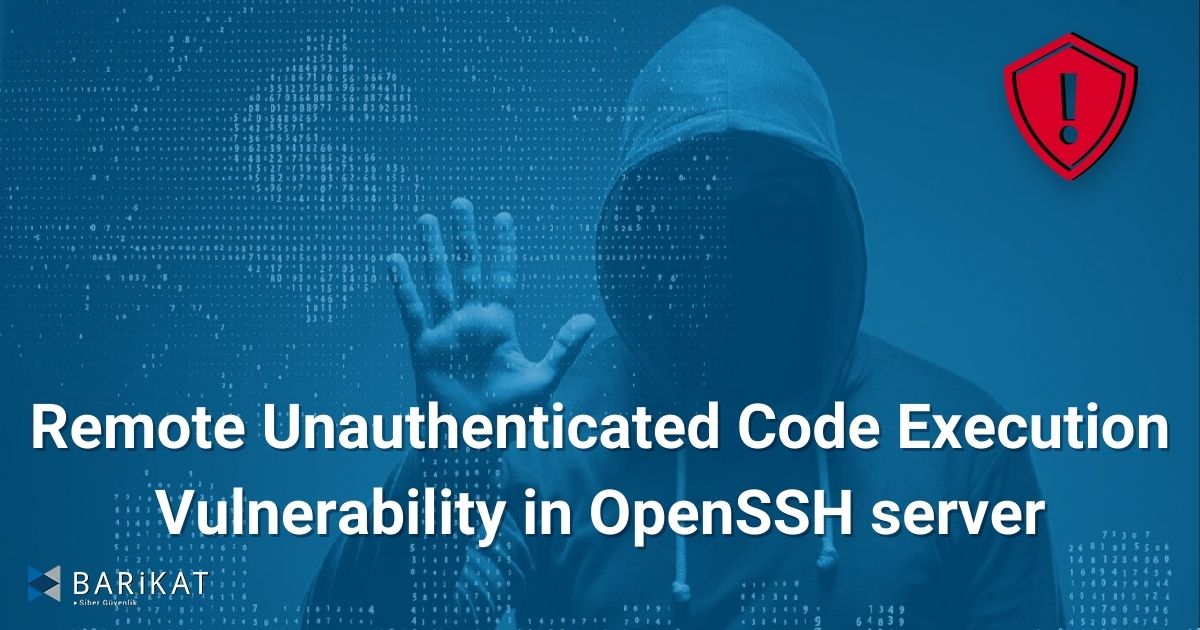Remote Unauthenticated Code Execution Vulnerability in OpenSSH server
Race condition in sshd(8) A critical vulnerability in sshd(8) was present in Portable OpenSSH versions between 8.5p1 and 9.7p1 (inclusive) that may allow arbitrary code execution with root privileges. Successful exploitation has been demonstrated on 32-bit Linux/glibc systems with ASLR.

Under lab conditions, the attack requires on average 6-8 hours of continuous connections up to the maximum the server will accept. Exploitation on 64-bit systems is believed to be possible but has not been demonstrated at this time. It's likely that these attacks will be improved upon. Exploitation on non-glibc systems is conceivable but has not been examined.
Systems that lack ASLR or users of downstream Linux distributions that have modified OpenSSH to disable per-connection ASLR re-randomisation (yes - this is a thing, no - we don't understand why) may potentially have an easier path to exploitation. OpenBSD is not vulnerable.
We thank the Qualys Security Advisory Team for discovering, reporting and demonstrating exploitability of this problem, and for providing detailed feedback on additional mitigation measures.
Affected Systems
- OpenSSH versions earlier than 4.4p1 are vulnerable to this signal handler race condition unless they are patched for CVE-2006-5051 and CVE-2008-4109.
- Versions from 4.4p1 up to, but not including, 8.5p1 are not vulnerable due to a transformative patch for CVE-2006-5051, which made a previously unsafe function secure.
- The vulnerability resurfaces in versions from 8.5p1 up to, but not including, 9.8p1 due to the accidental removal of a critical component in a function.
- OpenBSD systems are unaffected by this bug, as OpenBSD developed a secure mechanism in 2001 that prevents this vulnerability.
IoC’s
-
Recommended Solution(s)
Upgrade to OpenSSH version 9.8 or later.
Mitigations
Immediate Steps to Mitigate Risk
Addressing the regreSSHion vulnerability in OpenSSH, which enables remote code execution on Linux systems, demands a focused and layered security approach. Here are concise steps and strategic recommendations for enterprises to safeguard against this significant threat:
Patch Management: Quickly apply available patches for OpenSSH and prioritize ongoing update processes.
Enhanced Access Control: Limit SSH access through network-based controls to minimize the attack risks.
Network Segmentation and Intrusion Detection: Divide networks to restrict unauthorized access and lateral movements within critical environments and deploy systems to monitor and alert on unusual activities indicative of exploitation attempts.
CVE / CWE
CVE-2024-6387
Related Website(s)
* Vulnerabilities with a CVSS 3.1 score between 7.0 and 8.9 are evaluated to be “high” whereas vulnerabilities with a CVSS 3.1 score between 9.0 and 10.0 are evaluated to be “critical”.
Current Security Vulnerability Reports
İSTANBUL
+90 216 504 53 32
Aydınevler Mahallesi,İsmet İnönü Cadddesi,Küçükyalı Ofis Park A Blok,No:20/1 Maltepe İstanbul
ANKARA
+90 312 235 44 51
VULNERABILITY NEWSLETTER
You can register to our newsletter on the home page to be instantly informed about security vulnerabilities.
